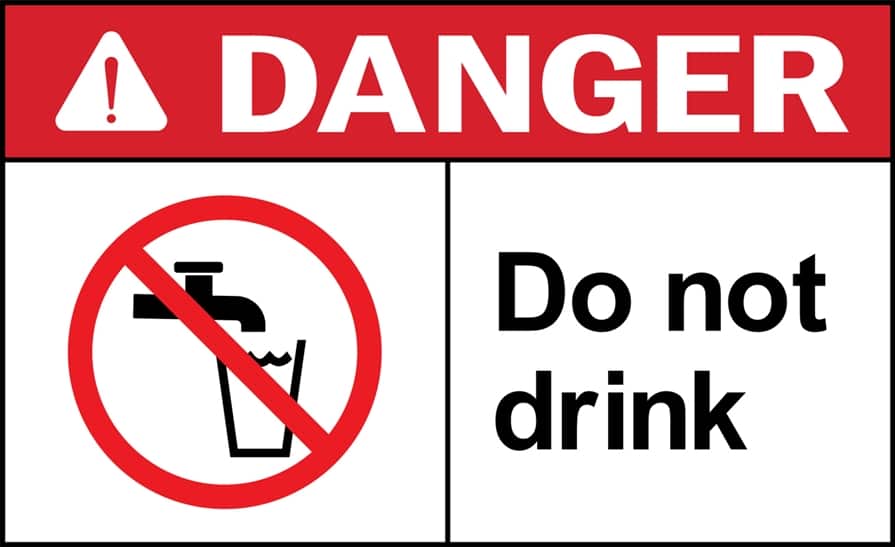DO NOT DRINK OUR WATER!
When you come to my clinic, PLEASE don’t drink the tap water.
Our tap water contains ten toxins in potentially unsafe levels, including nine carcinogens. (You can check out the water quality in your zip code HERE)
How to Have Safe, Healthy Water to Drink
1: Don’t drink tap water. Why not? Put your zip code into this search and see exactly.
2: Filter water that you cook with or drink. On a budget? You can use a carbon filter on your tap or a filtered water pitcher. Carbon filters (including those on filter pitchers) reduce many common contaminants such as lead, and the disinfectants used to treat tap water. Better (FAR better) is a reverse osmosis filter that gets most contaminants out.
3: Carry and store water in safe containers. Use stainless steel and (shatterproof) glass containers. Plastic can break down and release chemicals into the water.
4: Don’t trust bottled waters. Many “spring waters” are processed tap water, no matter what the label says.
Subscribe Now! Get More Health Info
An Ideal, Yet Practical Water Solution
In a typical residence, two water contamination problems need solutions:
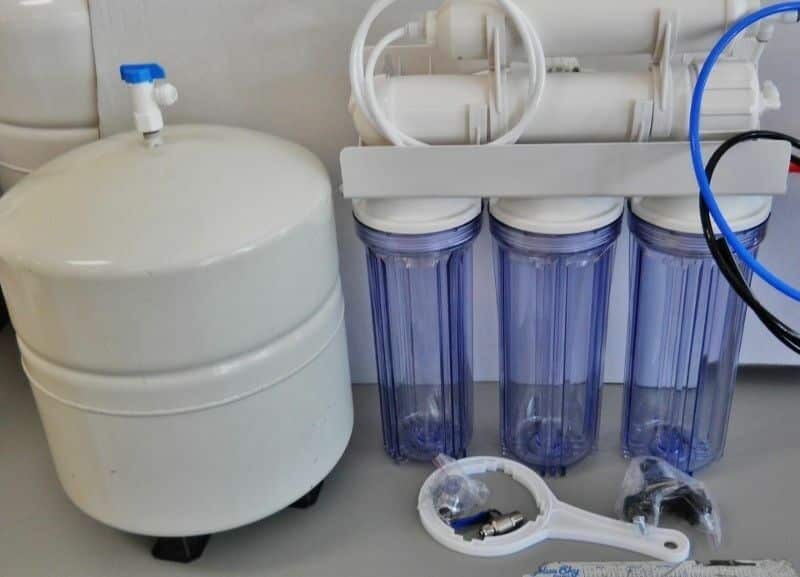
Reverse Osmosis Under-Sink Filter System
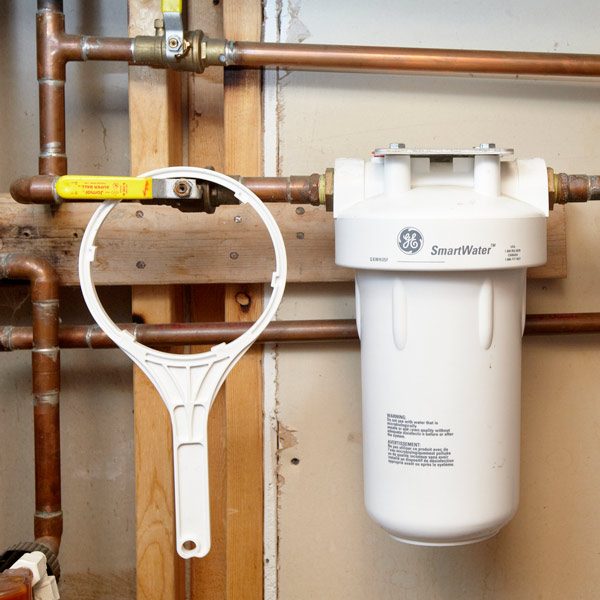
Whole House Carbon Filter on Water Supply Line
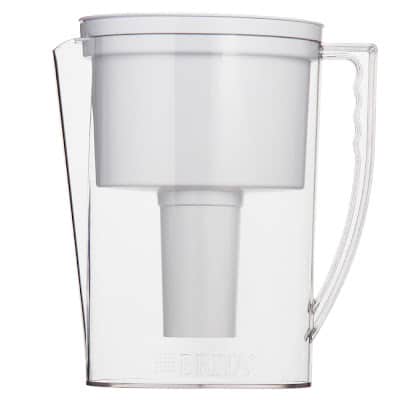
Water Pitcher with Carbon Filter
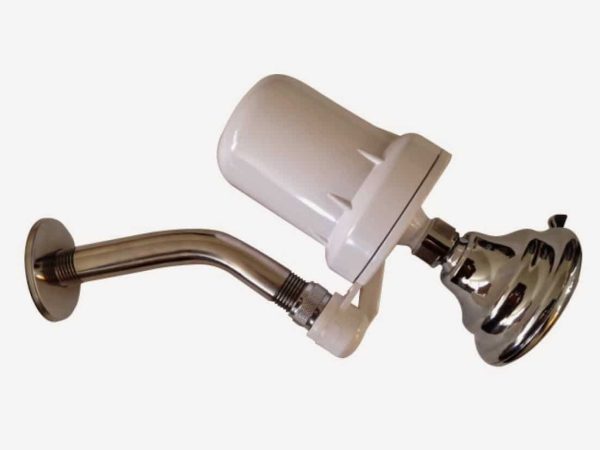
Showerhead Carbon Filter
1: Drinking and cooking water needs to be as clean as possible but still contain natural minerals and electrolytes.
The best cost-effective solution is a reverse osmosis water filter. These filters look a bit like a rocket engine, with bottles and tubes in all directions. However, they are inexpensive ($250 – $700), not particularly hard to install (DIY or a simple handyman job), and fit under your kitchen sink. A bar tap on your sink dispenses the clean water for cooking and drinking. You can pick one up at Home Depot.
Strangely, DISTILLED WATER is not a healthy choice. See the article below, “Potential Risks of Distilled Water” for more information.
2: Water for bathing and handwashing needs to contain safe chlorine levels.
Chlorine is a necessary evil for tap water. Like water in your swimming pool, dangerous bacteria and fungus will grow in non-chlorinated water. The CDC says that four parts per million is the limit of chlorine in tap water. Because the danger of too little chlorine is much worse than too much, city water systems can err on the high side.
How to know if there is too much chlorine in your tap water?
- Tap water smells like a swimming pool. If your tap water really smells, it may have too much chlorine.
- Dry, itchy skin. If this is worse after a shower or bath, you should test your chlorine levels.
You can get a simple strip test for your tap water for $12 HERE (Amazon)
The best fix for chlorine is to get 95% of it out of your water. You do this with one of two solutions:
1: Showerhead filter. It screws onto your showerhead, costs $50, and lasts for years. This eliminates the hot chlorinated water you are soaking in and the chlorinated steam you are breathing.
2: Whole House Filter. This is a cartridge that is mounted (usually) where your water line comes into your house. It takes a handyman or plumber to install it ($200-ish), costs as little as $200, and lasts at least a year. Replacement cartridges cost $30 and can be installed (by you) in a few minutes. This cleans up all the water going into your house, usually including the water you use outside on your lawn.

Are You at Wits’ End With a Health Problem?
I may be able to help you.
Would you please take five minutes to fill out a health assessment survey and send it to me? I’ll review your information, then have my assistant call you for any additional information. Then, I’ll let you know if your case might be a good fit for my clinic. This assessment is complimentary, with no strings attached. Either I can help you–or point you in the right direction to get help.
Don’t give up! You can recover your health if you persist.
Potential Risks of Distilled Water
Ronald Grisanti D.C., D.A.B.C.O., DACBN, MS, CFMP
While distilled water is the purest type, it’s not necessarily the healthiest.
The distillation process is very effective at removing potentially harmful contaminants, but it also removes the natural minerals and electrolytes found in water.
If you drink distilled water, be aware that it may have some drawbacks. The lack of minerals could prove problematic if you aren’t getting them from another dietary source. In addition, the water might cause intestinal discomfort.
Along with unwanted impurities, beneficial minerals like calcium and magnesium are also left behind as the steam rises during the distillation process.
Distillation typically removes around 99.9% of all minerals found in tap water.
The lack of naturally occurring minerals in distilled water, such as sodium, chloride, and potassium, can negatively affect health. These minerals are known as electrolytes.
Therefore, your body is forced to give electrolytes to the mineral and nutrient-free water. With this, your electrolyte level will slowly decrease and eventually cause electrolyte imbalance in your body.
To sum up, if you drink distilled water consistently, you are putting your health at risk. It has insufficient minerals and nutrients that can protect your body against diseases and illnesses. Second, it can potentially lead to certain health problems such as bone deformities, digestive tract disorders, and even blood-related sickness.
I believe the best source of drinking water is spring water.
Of course, I expect some debate about my opinion but spring water from a reliable source has proven to have many health benefits.
Here are some valuable benefits:
- Balancing the pH of your body
- Natural source of necessary minerals
How to choose a good spring water brand?
The points to remember when choosing a water company are as follows:
- Determine how long they are in the business
- The source of water
- Does the water pass purification and tests
- Is there a water test report available (especially on their website)
- Does the bottle have the label of the brand?
Compliments from Functional Medicine University

